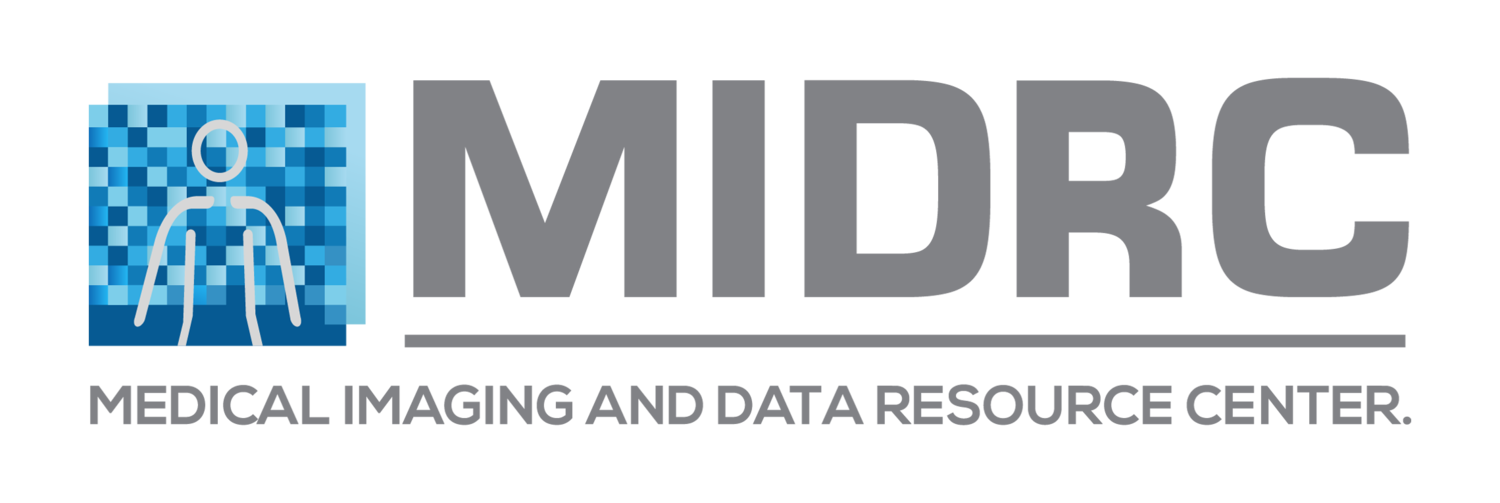Web-based tools.
Last updated November, 2024
MIDRC has developed various tools to assist researchers in tasks such as cohort building, inter-repository indexing, automated interpretation of radiology reports, and selecting appropriate metrics for evaluating AI performance, among others. Tools are continuously being developed, so please check back often!
This page is dedicated to stand-alone tools. No programming skills or downloading required! Please see our ‘Downloadable tools’ page for other tools such as open-source material downloadable from GitHub.
The MIDRC Data Portal is a platform that gives researchers easy access to a large collection of medical imaging data. It includes simple search and filtering tools to help find and explore different datasets. The portal supports various data formats and works with analysis tools to make research and data management easier.
Please also check out the MIDRC seminar on using the data portal!
The MIDRC BDF Imaging Hub is a platform that provides access to a wide range of medical imaging data and resources. It serves as a central place for sharing data, tools, and documentation, helping researchers collaborate more easily. The hub includes tools for searching, viewing, and analyzing data, making it simple to conduct research and gain insights.
Watch the short video to find out more or check out this MIDRC seminar.
RadGPT is an AI tool that helps patients understand their radiology reports. It explains medical terms in plain language and suggests follow-up questions patients can ask their doctors. Available on the VILMEDIC platform, it aims to make medical information clearer and improve communication between patients and healthcare providers.
The MIDRC-MetricTree is an interactive tool that helps researchers choose the right performance metrics for medical imaging models. It guides users step by step to find metrics that fit their specific research goals. This tool improves model evaluation by giving personalized recommendations and useful insights.
Read more in the MIDRC-MetricTree peer-reviewed publication.
The MIDRC AI reliability tool helps researchers find and fix potential issues in AI and machine learning models used in medical imaging. It guides users in spotting sources of trouble and suggests ways to reduce them, leading to more accurate results. This tool promotes best practices for creating reliable AI/ML systems.
Read more in the peer-reviewed publication.
The MIDRC Helper AI tool is an advanced resource designed to assist researchers in navigating the extensive Medical Imaging and Data Resource Center (MIDRC) datasets. Through AI-driven search capabilities, it allows users to efficiently locate relevant imaging data, streamline the research process, and accelerate discoveries in medical imaging. The tool supports both basic and complex queries, making it accessible for a wide range of research needs, from initial data exploration to in-depth analysis.
Want to try out Helper AI yourself? Follow these steps to clone the Helper AI model and test it in your own private environment. You can even upload your own data to see how Helper AI performs with your specific use cases!
Learn more in this video on MIDRC helper AI!
Under development, available soon!
The MIDRC DART (Data Analysis, Review, and Transformation) tool facilitates the integration and sharing of imaging data across different institutions within the MIDRC ecosystem. It provides a streamlined process for data curation, harmonization, and secure transfer, enhancing collaboration and research efficiency. The video highlights its features, including data quality checks, customizable workflows, and automated processes that ensure the integrity and consistency of shared imaging datasets.
Learn more in this video on MIDRC BIH indexing for restricted clinical trials dataI!
Under development, available soon!
The MIDRC Interoperability Tool between Imaging & Non-Imaging Data Commons is designed to facilitate seamless data integration and exchange between imaging and non-imaging data repositories. This tool ensures interoperability across different data commons, enhancing the ability to securely share, process, and analyze diverse datasets in healthcare and research environments, contributing to more comprehensive and collaborative research efforts.
Learn more in this video on MIDRC interoperabilityI!
Questions? Check out our answers to frequently asked questions!
How to acknowledge 1) MIDRC funded research and 2) use of data downloaded from the MIDRC Data Commons








